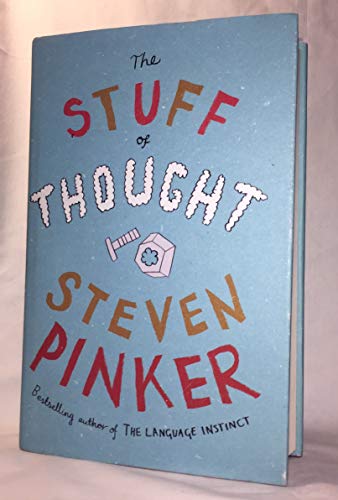9780670063277 - The Stuff of Thought: Language as a Window into Human Nature von Pinker, Steven (5 Ergebnisse)
FeedbackSuchfilter
Produktart
- Alle Product Types
- Bücher (5)
- Magazine & Zeitschriften (Keine weiteren Ergebnisse entsprechen dieser Verfeinerung)
- Comics (Keine weiteren Ergebnisse entsprechen dieser Verfeinerung)
- Noten (Keine weiteren Ergebnisse entsprechen dieser Verfeinerung)
- Kunst, Grafik & Poster (Keine weiteren Ergebnisse entsprechen dieser Verfeinerung)
- Fotografien (Keine weiteren Ergebnisse entsprechen dieser Verfeinerung)
- Karten (Keine weiteren Ergebnisse entsprechen dieser Verfeinerung)
- Manuskripte & Papierantiquitäten (Keine weiteren Ergebnisse entsprechen dieser Verfeinerung)
Zustand Mehr dazu
Einband
- alle Einbände
- Hardcover (5)
- Softcover (Keine weiteren Ergebnisse entsprechen dieser Verfeinerung)
Weitere Eigenschaften
- Erstausgabe (1)
- Signiert (Keine weiteren Ergebnisse entsprechen dieser Verfeinerung)
- Schutzumschlag (1)
- Angebotsfoto (Keine weiteren Ergebnisse entsprechen dieser Verfeinerung)
- Keine Print-on-Demand Angebote (5)
Sprache (1)
Preis
- Beliebiger Preis
- Weniger als EUR 20 (Keine weiteren Ergebnisse entsprechen dieser Verfeinerung)
- EUR 20 bis EUR 45
- Mehr als EUR 45
Gratisversand
- Kostenloser Versand nach Deutschland (Keine weiteren Ergebnisse entsprechen dieser Verfeinerung)
Land des Verkäufers
Verkäuferbewertung
-
The Stuff of Thought: Language as a Window into Human Nature
Anbieter: Revaluation Books, Exeter, Vereinigtes Königreich
EUR 32,64
Währung umrechnenEUR 11,48 für den Versand von Vereinigtes Königreich nach DeutschlandAnzahl: 1 verfügbar
In den WarenkorbHardcover. Zustand: Brand New. 1st edition. 512 pages. 9.25x6.00x1.50 inches. In Stock.
-
The Stuff of Thought: Language as a Window into Human Nature
Anbieter: London Bridge Books, London, Vereinigtes Königreich
EUR 28,38
Währung umrechnenEUR 28,70 für den Versand von Vereinigtes Königreich nach DeutschlandAnzahl: 1 verfügbar
In den WarenkorbHardcover. Zustand: New.
-
The Stuff of Thought: Language As a Window into Human Nature
Verlag: Viking Press, New York, New York, U.S.A., 2007
ISBN 10: 0670063274 ISBN 13: 9780670063277
Sprache: Englisch
Erstausgabe
EUR 43,57
Währung umrechnenEUR 30,21 für den Versand von USA nach DeutschlandAnzahl: 5 verfügbar
In den WarenkorbHardcover. Zustand: New. Zustand des Schutzumschlags: New. First Edition. First edition. 8vo. Hard cover binding, 499 pp. Another great book on language by Steven Pinker. New in new dustjacket.
-
The Stuff of Thought: Language as a Window into Human Nature
Anbieter: BennettBooksLtd, North Las Vegas, NV, USA
EUR 67,52
Währung umrechnenEUR 37,98 für den Versand von USA nach DeutschlandAnzahl: 1 verfügbar
In den Warenkorbhardcover. Zustand: New. In shrink wrap. Looks like an interesting title!
-
EUR 2.196,22
Währung umrechnenEUR 7,77 für den Versand von USA nach DeutschlandAnzahl: 2 verfügbar
In den WarenkorbHardcover. Zustand: New. *** FREE UPGRADE to Courier/Priority Shipping Upon Request *** - *** IN STOCK AND IMMEDIATELY AVAILABLE FOR SHIPMENT - Flawless copy, brand new, pristine, never opened -- Text in English. 512 pages. Description: "Bestselling Harvard psychology professor Pinker (The Blank Slate) investigates what the words we use tell us about the way we think. Language, he concludes, reflects our brain structure, which itself is innate. Similarly, the way we talk about things is rooted in, but not identical to, physical reality: human beings take the analogue flow of sensation the world presents to them and package their experience into objects and events. Examining how we do this, the author summarizes and rejects such linguistic theories as extreme nativism and radical pragmatism as he tosses around terms like content-locative and semantic reconstrual that may seem daunting to general readers. But Pinker, a masterful popularizer, illuminates this specialized material with homely illustrations. The difference between drinking from a glass of beer and drinking a glass of beer, for example, shows that the mind has the power to frame a single situation in very different ways. Separate chapters explore concepts of causality, naming, swearing and politeness as the tools with which we organize the flow of raw information. Metaphor in particular, he asserts, helps us entertain new ideas and new ways of managing our affairs. His vivid prose and down-to-earth attitude will once again attract an enthusiastic audience outside academia." - Publishers Weekly -- with a bonus offer--.


